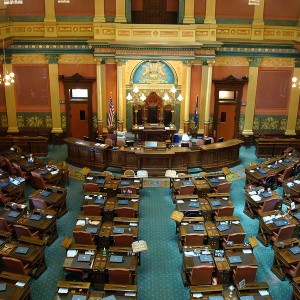 LANSING, Mich. — The Michigan House of Representatives has approved a state version of the federal Religious Freedom Restoration Act (RFRA) despite opposition from those who claim that the bill will give license to people of faith to “discriminate.”
LANSING, Mich. — The Michigan House of Representatives has approved a state version of the federal Religious Freedom Restoration Act (RFRA) despite opposition from those who claim that the bill will give license to people of faith to “discriminate.”
HB 5958 cleared the House Judiciary Committee 7-4 on Thursday, and then moved on to the full House, where it also passed 59-50. It now moves to the Senate for consideration, and if passed, will then be sent to the desk of Gov. Rick Snyder (R).
The bill essentially mirrors the federal Religious Freedom Restoration Act, which was signed into law in 1993 by then-President Bill Clinton, However, as the law only applies on a federal level, the U.S. Supreme Court has urged states to enact their own RFRA to protect citizens.
“The free exercise of religion is an inherent, fundamental, and unalienable right secured by Article 1 of the state Constitution of 1963 and the First Amendment to the United States Constitution,” the proposed statute reads.
It then uses federal legal standards to mandate that laws cannot be used to substantially burden the religious beliefs of inhabitants, unless the law serves a compelling government interest and is only uses the least restrictive means to further that specific interest. The proposal also allows those who believe that a law violates their religious liberty to bring a legal challenge against it, such as did companies like Hobby Lobby.
“I support individual liberty and I support religious freedom,” House Speaker Jase Bolger (R) declared Thursday to the Judiciary Committee. “I have been horrified as some have claimed that a person’s faith should only be practiced while hiding in their home or in their church.”
But Bolger has faced opposition from those who state that the bill promotes discrimination. Democratic members who spoke against the RFRA specifically cited their disagreement with allowing businesses to decline homosexuals should their request violate the conscience of the owner, or allowing pharmacies to refuse to dispense abortifacients due to their religious beliefs.
“This bill moves us in a new and uncharted direction. It requires me and others to practice the faith of our employers, grocers and pharmacists,” Rep. Vicki Barnett (D-Farmington Hills) told those gathered. “I should not be forced to follow the religion of my pharmacist.”
But Bolger said that the bill is not new at all, since it is only modeled after federal law to also ensure protections on a state level.
“Do you think that Bill Clinton and Ted Kennedy were extremists?” he told MSNBC. “We modeled [this bill] directly after what they did. I’m baffled to hear that what we’re doing is out of line.”
“I am asking you today to give Michigan’s law abiding citizens the same protections as Michigan’s incarcerated felons have,” Bolger also declared prior to the vote Thursday.
A number of states have likewise passed RFRA bills in recent years, including in Mississippi and Ohio.
“[The Declaration of Independence] talks about how our right as human beings are not given to us by government, nor the Constitution, but by God,” declared Ohio Rep. Bill Patmon (D) earlier this year. “Protect what God has given you; that is the whole idea.”
Become a Christian News Network Supporter...


